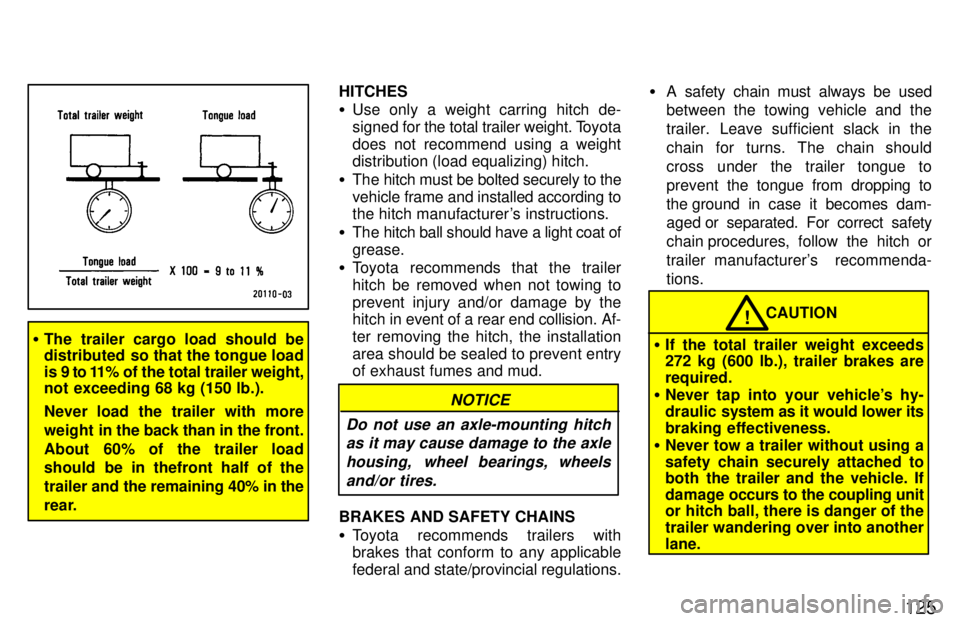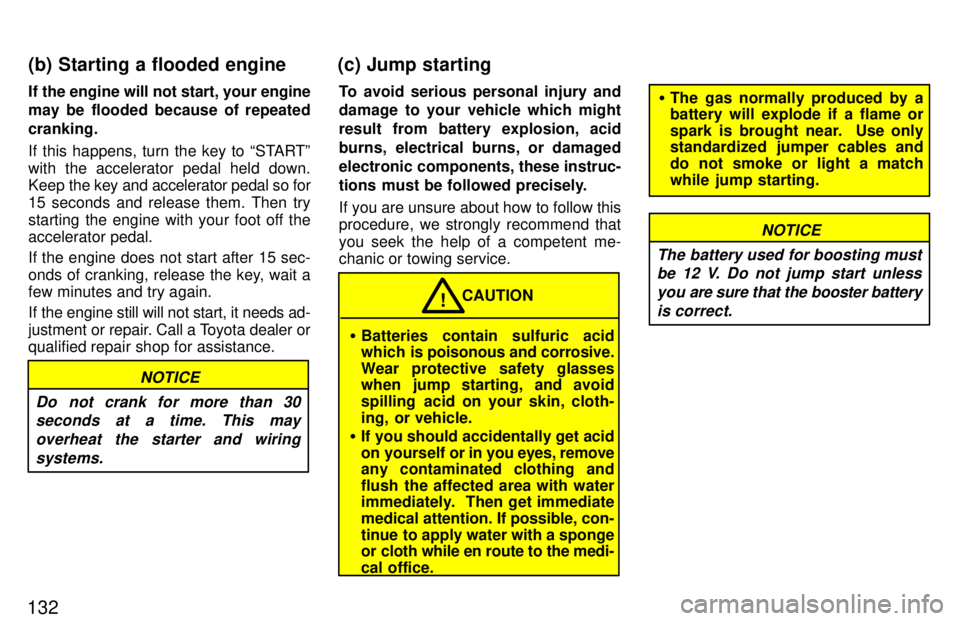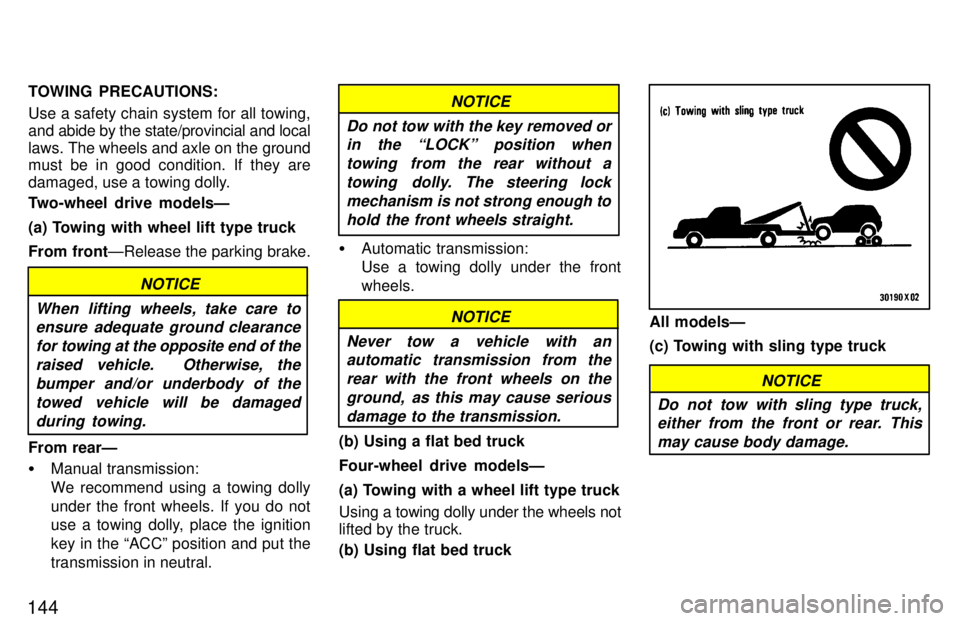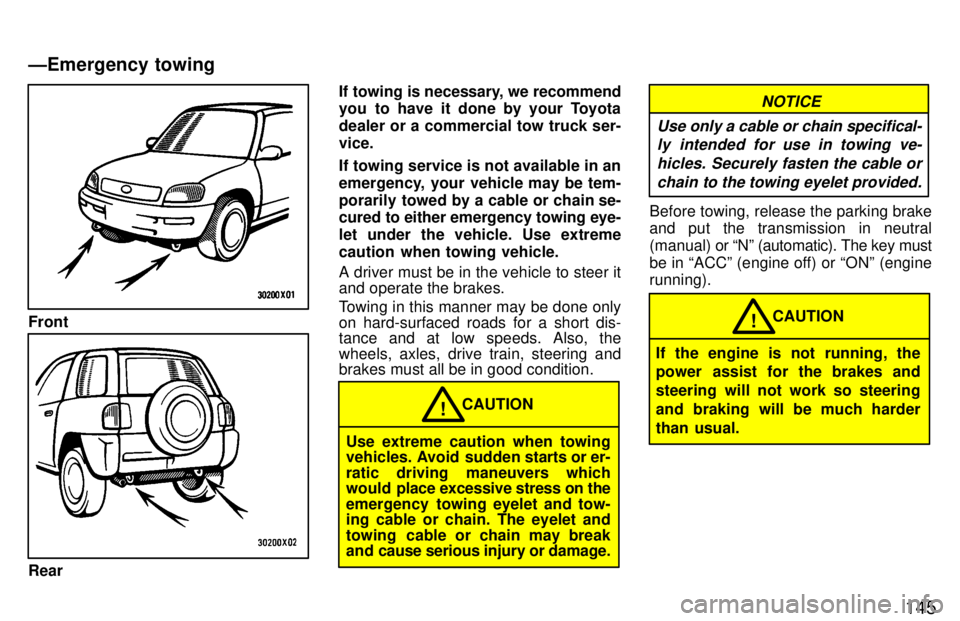1997 TOYOTA RAV4 towing
[x] Cancel search: towingPage 124 of 198

123
Use a washer fluid containing an anti-
freeze solution.
This product is available at your Toyota
dealer and most auto parts stores. Follow
the manufacturer's directions for how
much to mix with water.
Do not use engine antifreeze or any
other substitute because it may
damage your vehicle's paint.
NOTICE
Do not use your parking brake when there is a possibility it could freeze. When parking, put the transmission into
Pº (automatic) or into first or reverse
(manual) and block the rear wheels. Do
not use the parking brake, or snow or wa-
ter accumulated in and around the parking brake mechanism may freeze, making it
hard to release. Keep ice and snow from accumulating
under the fenders.
Ice and snow built up under your fenders
can make steering difficult. During bad winter driving, stop and check under the
fenders occasionally. Depending on where you are driving,
we recommend you carry some emer- gency equipment.
Some of the things you might put in the ve-
hicle are tire chains, window scraper, bag of sand or salt, flares, small shovel, jump- er cables, etc.
Your vehicle is designed primarily as a passenger-and-load-carrying vehicle.
Towing a trailer will have an adverse ef-fect on handling, performance, braking, durability and driving economy (fuel con-
sumption, etc.). Your safety and satis-faction depend on the proper use of cor- rect equipment and cautious driving habits. For your safety and the safety ofothers, you must not overload your ve-
hicle or trailer. Ask your local Toyota dealer for further details before towing. WEIGHT LIMITS
Before towing, make sure the total
trailer weight, gross combination
weight, gross vehicle weight, grossaxle weight and trailer tongue load are
all within the limits.
The total trailer weight and tongue load
can be measured with platform scales
found at a highway weighing station,
building supply company, trucking com-
pany, junk yard, etc.
Trailer towing
Page 126 of 198

125
�The trailer cargo load should be
distributed so that the tongue load
is 9 to 11% of the total trailer weight,
not exceeding 68 kg (150 lb.).
Never load the trailer with more
weight in the back than in the front.
About 60% of the trailer load
should be in thefront half of the
trailer and the remaining 40% in the
rear. HITCHES �
Use only a weight carring hitch de-
signed for the total trailer weight. T oyota
does not recommend using a weight
distribution (load equalizing) hitch.
� The hitch must be bolted securely to the vehicle frame and installed according to
the hitch manufacturer's instructions.
� The hitch ball should have a light coat of grease.
� Toyota recommends that the trailer
hitch be removed when not towing toprevent injury and/or damage by the
hitch in event of a rear end collision. Af-
ter removing the hitch, the installation
area should be sealed to prevent entry of exhaust fumes and mud.
NOTICE
Do not use an axle-mounting hitch as it may cause damage to the axle
housing, wheel bearings, wheels and/or tires.
BRAKES AND SAFETY CHAINS � Toyota recommends trailers with brakes that conform to any applicable
federal and state/provincial regulations. �
A safety chain must always be used
between the towing vehicle and the
trailer. Leave sufficient slack in the
chain for turns. The chain should
cross under the trailer tongue toprevent the tongue from dropping to
the ground in case it becomes dam-
aged or separated. For correct safety
chain procedures, follow the hitch or
trailer manufacturer's recommenda-tions.
CAUTION!
� If the total trailer weight exceeds
272 kg (600 lb.), trailer brakes are required.
� Never tap into your vehicle's hy-
draulic system as it would lower its
braking effectiveness.
� Never tow a trailer without using a
safety chain securely attached to
both the trailer and the vehicle. If
damage occurs to the coupling unit
or hitch ball, there is danger of the
trailer wandering over into anotherlane.
Page 127 of 198

126
TIRES �
Ensure that your vehicle's tires are
properly inflated. See Chapter 7-2 forinstructions.
� The trailer tires should be inflated to
the pressure recommended by the
trailer manufacturer in respect to the
total trailer weight.
TRAILER LIGHTS � Trailer lights must comply with federal,
state/provincial and local regulations. See your local recreational vehicle
dealer or rental agency for the correcttype of wiring and relays for your trail-
er. Check for correct operation of the
turn signals and stop lights each time
you hitch up. Direct splicing may dam-
age your vehicle's electrical system
and cause a malfunction of your lights.
BREAK-IN SCHEDULE � Toyota recommends that you do not
tow a trailer with a new vehicle or a ve-
hicle with any new power train compo-
nent (engine, transmission, differen-tial, wheel bearing, etc.) for the first
800 km (500 miles) of driving. MAINTENANCE �
If you tow a trailer, your vehicle will re-
quire more frequent maintenance due
to the additional load. For this informa-
tion, please refer to the scheduled
maintenance information in the Own-
er 's Manual Supplement/Maintenance Scheduleº.
� Retighten all fixing bolts of the towing
ball and bracket after approximately
1000 km (600 miles) of trailer driving.
PRE-T OWING SAFETY CHECK � Check that your vehicle remains level
when a loaded or unloaded trailer is
hitched. Do not drive if the vehicle has
an abnormal nose-up or nose-down
condition, and check for improper
tongue load, overload, worn suspen-
sion or other possible causes.
� Make sure the trailer cargo is securely
loaded so that it cannot shift.
� Check that your rear view mirrors con-
form to any applicable federal, state/
provincial or local regulation. If not,
install the rear view mirrors required
for towing purpose. TRAILER TOWING TIPS
When towing a trailer, your vehicle will
handle differently than when not tow-ing. The three main causes of vehicle
trailer accidents are driver error, ex-
cessive speed and improper trailer
loading.
Keep these in mind when tow-
ing: � Before starting out, check operation of
the lights and all vehicle-trailer con-
nections. After driving a short dis-
tance, stop and recheck the lights and
connections. Before actually towing a
trailer, practice turning, stopping and
backing with a trailer in an area away
from traffic until you learn the feel.
� Because stopping distance may be in-
creased, vehicle-to-vehicle distance
should be increased when towing a
trailer. For each 16 km/h (10 mph) ofspeed, allow at least one vehicle and
trailer length between you and the ve-
hicle ahead. Avoid sudden braking as you may skid, resulting in jackknifing and loss of control This is especially
true on wet or slippery surfaces.
Page 129 of 198

128
When restarting out after parking on a slope:
1. With the transmission in Pº position
(automatic) or the clutch pedal de-
pressed (manual), start the engine.
(With an automatic transmission, be
sure to keep the brake pedal de- pressed.)
2. Shift into gear.
3. Release the parking brake (also foot brake on automatic transmission ve- hicles) and slowly pull or back away
from the wheels blocks. Stop and ap- ply your brakes.
4. Have someone retrieve the blocks.
CAUTION!
� Do not exceed 72 km/h (45 mph) or
the posted towing speed limit,
whichever is lower. Because insta- bility (swaying) of a towing vehicle
trailer combination usually in-
creases as the speed increases, ex-
ceeding 72 km/h (45 mph) maycause loss of control.
� Slow down and downshift before
descending steep or long down- hill grades. Do not make sudden downshifts.
� Avoid holding the pedal down
too long or too frequently. This
could cause the brakes to over-
heat and result in reduced brak-
ing efficiency. Getting
more kilometers/mileage from a li-
ter/gallon of fuel is easy-just take it easy.
It will help make your vehicle last longer,
too. Here are some specific tips on how to
save money on both fuel and repairs: � Keep your tires inflated at the cor- rect pressure. Underinflation causes
tire wear and wastes fuel. See Chapter
7-2 for instructions.
� Do not carry unneeded weight in
your vehicle. Excess weight puts a
heavier load on the engine, causing greater fuel consumption.
� Avoid lenghty warm-up idling.
Once the engine is running smoothly,
begin drivingÐbut gently. Remember,
however, that on cold winter days this
may take a little longer.
� Accelerate slowly and smoothly.
Avoid jackrabbit starts. Get into high
gear as quickly as possible.
� Avoid long engine idling. If you have
a long wait and you are not in traffic, it
is better to turn off the engine and start
again later.
� Avoid engine lug or overrevving.
Use a gear position suitable for the
road on which you are travelling.
How to save fuel and make
your vehicle last longer, too
Page 132 of 198

132If the engine will not start, your engine
may be flooded because of repeated cranking.
If this happens, turn the key to STARTº with the accelerator pedal held down.
Keep
the key and accelerator pedal so for
15 seconds and release them. Then try
starting the engine with your foot off the accelerator pedal.
If the engine does not start after 15 sec-
onds of cranking, release the key, wait a few minutes and try again.
If the engine still will not start, it needs ad-
justment or repair. Call a Toyota dealer or
qualified repair shop for assistance.
NOTICE
Do not crank for more than 30 seconds at a time. This may
overheat the starter and wiringsystems.
To avoid serious personal injury and
damage to your vehicle which might
result from battery explosion, acid
burns, electrical burns, or damaged
electronic components, these instruc-
tions must be followed precisely.
If you are unsure about how to follow this procedure, we strongly recommend that you seek the help of a competent me-
chanic or towing service.
� Batteries contain sulfuric acid
which is poisonous and corrosive.
Wear protective safety glasses
when jump starting, and avoid
spilling acid on your skin, cloth-
ing, or vehicle.
� If you should accidentally get acid
on yourself or in you eyes, remove
any contaminated clothing and
flush the affected area with water
immediately. Then get immediate
medical attention. If possible, con-
tinue to apply water with a sponge
or cloth while en route to the medi- cal office. CAUTION
!
�
The gas normally produced by a battery will explode if a flame or
spark is brought near. Use only
standardized jumper cables and
do not smoke or light a match
while jump starting.
NOTICE
The battery used for boosting must be 12 V. Do not jump start unless
you are sure that the booster batteryis correct.
(b) Starting a flooded engine (c) Jump starting
Page 143 of 198

143
Two-wheel drive modelsFour-wheel drive modelsIf towing is necessary, we recommend
you to have it done by your Toyota
dealer or a commercial tow truck ser-
vice. In consultation with them, have
your vehicle towed using either (a) or(b).
Only when you cannot receive a tow-
ing service from a Toyota dealer or
commercial tow truck service, tow
your vehicle carefully in accordance
with the instructions given in
ÐEmergency towingº in this part. Proper equipment will help ensure that your vehicle is not damaged while being
towed. Commercial operators are gener-
ally
aware of the state/provincial and local
laws pertaining to towing.
Your vehicle can be damaged if it is towed
incorrectly. Although most operators know the correct procedure, it is possible
to make a mistake. To avoid damage to your vehicle, make sure the following few
precautions are observed. If necessary,
show this page to the tow truck driver.
If your vehicle needs to be towedÐ
Page 144 of 198

144TOWING PRECAUTIONS: Use a safety chain system for all towing,
and abide by the state/provincial and local
laws. The wheels and axle on the ground
must be in good condition. If they are
damaged, use a towing dolly.
Two-wheel drive modelsÐ
(a) Towing with wheel lift type truck
From front
ÐRelease the parking brake.
NOTICE
When lifting wheels, take care to ensure adequate ground clearance
for towing at the opposite end of theraised vehicle. Otherwise, the bumper and/or underbody of thetowed vehicle will be damaged during towing.
From rearÐ � Manual transmission:
We recommend using a towing dolly
under the front wheels. If you do not
use a towing dolly, place the ignition key in the ACCº position and put thetransmission in neutral.
NOTICE
Do not tow with the key removed or in the LOCKº position when
towing from the rear without atowing dolly. The steering lock mechanism is not strong enough tohold the front wheels straight.
� Automatic transmission: Use a towing dolly under the front wheels.
NOTICE
Never tow a vehicle with an automatic transmission from the
rear with the front wheels on theground, as this may cause serious damage to the transmission.
(b) Using a flat bed truck Four-wheel drive modelsÐ
(a) Towing with a wheel lift type truck
Using a towing dolly under the wheels not
lifted by the truck. (b) Using flat bed truck
All modelsÐ
(c) Towing with sling type truck
Do not tow with sling type truck,
either from the front or rear. This
may cause body damage.
NOTICE
Page 145 of 198

145
Front
RearIf towing is necessary, we recommend
you to have it done by your Toyota
dealer or a commercial tow truck ser-vice.
If towing service is not available in an
emergency, your vehicle may be tem-
porarily towed by a cable or chain se-
cured to either emergency towing eye-
let under the vehicle. Use extreme
caution when towing vehicle. A driver must be in the vehicle to steer it and operate the brakes.
Towing in this manner may be done only
on hard-surfaced roads for a short dis-
tance and at low speeds. Also, the
wheels, axles, drive train, steering and brakes must all be in good condition.
CAUTION!
Use extreme caution when towing
vehicles. Avoid sudden starts or er- ratic driving maneuvers which
would place excessive stress on the
emergency towing eyelet and tow-ing cable or chain. The eyelet and
towing cable or chain may break
and cause serious injury or damage.
NOTICE
Use only a cable or chain specifical- ly intended for use in towing ve-
hicles. Securely fasten the cable orchain to the towing eyelet provided.
Before towing, release the parking brake
and put the transmission in neutral
(manual) or Nº (automatic). The key must
be in ACCº (engine off) or ONº (engine running).
CAUTION!
If the engine is not running, the
power assist for the brakes and
steering will not work so steering
and braking will be much harder
than usual.
ÐEmergency towing